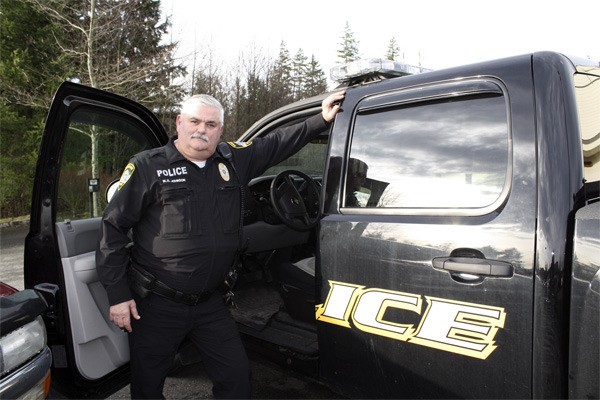Quick thinking and a handy tree branch helped turn Dave Johnson into a Snoqualmie Police Officer almost 30 years ago.
Johnson had been an oil rig worker in Williston, N.D., when he came to Snoqualmie to visit an old school friend, Ed Crosson. At the time, Crosson was a police sergeant in Snoqualmie, and on duty.
While Johnson was visiting, “We went out on a burglary call, and we caught the burglars,” he said. It’s more fun when he tells the whole story, though.
“Some kids broke into the administration building,” Johnson explained. He and Ed arrived just as the trespassers were leaving the building. “Well, I’d watched Rosco P. Coltrane, so I picked up a tree branch and pointed it at them. I told them to stop, and they thought I had a shotgun, so they stopped. Ed looked at me, and asked if I wanted a job.”
Johnson took the job, moved back to Snoqualmie, and has been with the department ever since, with one important difference when he goes on calls.
“From then on, it was a gun!” he laughed.
Johnson hung up his gun and badge on Saturday, Jan. 29, to retire to his place in the mountains, and to fish. He’d been with the Snoqualmie Police Department 29 years, since 1982 as a reservist, and since 1988 as a full-time officer.
“It’s going to be hard to leave,” Johnson said during his last week. “They’ve been family for more than 20 years here.”
He’s not talking only about his fellow officers. Johnson has called Snoqualmie home for most of his life, and says he wanted to join the police because “I knew the people and I like helping people.”
Johnson moved to the area in 1960 with his adoptive parents, attended local schools and graduated from Mount Si High School in 1971. He left the area a few years later as a journeyman lineman, and came back as police reservist, working as a logger during the day, and completing 220 hours of police academy work in night training.
Back then, he remembers, he didn’t start out with much more than a tree branch.
“If the city had a uniform that fit you, you got a uniform,” he said. “Then they gave you 18 bullets for whatever gun you had, a badge, commission card, and a pair of handcuffs.” Everything else was the recruit’s responsibility, including the academy training.
The small department had an even smaller budget. They bought all their patrol cars from other cities’ departments, and all of them had more than 100,000 miles on them.
“Our first police department was in the mayor’s chamber in the old city hall, and about half the size of this kitchen,” he said, gesturing around the police break room. That department had a desk and a holding cell in the room that they shared with the mayor.
When they moved to a larger police department, the officers did most of the renovations. They kept up the maintenance on their vehicles, too. The small size of the department wasn’t a bad thing, though, and it complemented the city.
“Down in old Snoqualmie, there were five of us in the department, and we knew everybody,” Johnson said. That made it a lot harder for anyone to commit a crime without the police finding out. “They’d take off running, and we didn’t have to chase them. We’d just wait for them in their driveways, and when they came home, oh, my goodness!”
Johnson laughs about this apprehension method unique to small towns, and he has a lot of stories that reflect the more peaceful past. His department foursome, for example, used to play golf at the end of a graveyard shift, and then pay their green fees when employees arrived to open the course for the day.
A lot has changed, though, in Johnson’s 29 years on the force. The nature of crimes in Snoqualmie isn’t much different, but the volume has increased with the population, especially drug or alcohol-related assaults, he said. The department started growing rapidly in the late 1980s, when development began on Snoqualmie Ridge, and today includes 17 officers.
What’s changed the most, though, is the general level of respect people used to have. Events like the Nov. 29, 2009, shooting of four Lakewood police officers just confirm Johnson’s opinion.
“Police officers used to be respected in the old days, but when you stop and look at it, so were the adults,” Johnson said. “That’s just the biggest thing I see in society today, is lack of respect.”
He is proud of “gaining the respect of the citizens here,” and he always tried to return it in kind. When arresting people, he said, “You catch ‘em, you treat ‘em like a human, like a person, and they’ll rehabilitate themselves a lot of times.”
Johnson had to do one last bit of quick thinking to conclude his career with the Snoqualmie Police. He’d originally planned to retire at the end of the month, but that was not a scheduled work day for him, so he made the 29th his last day
“Why come in on my day off, just to retire?” he asked.



